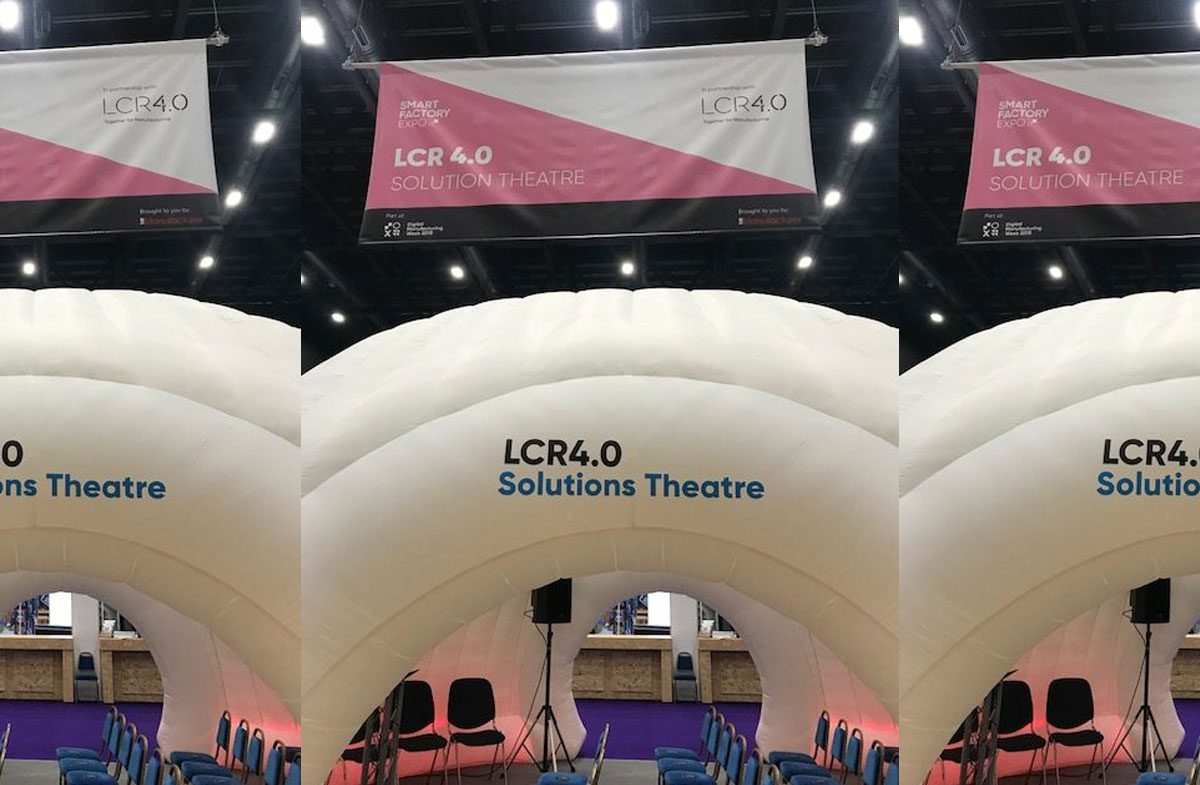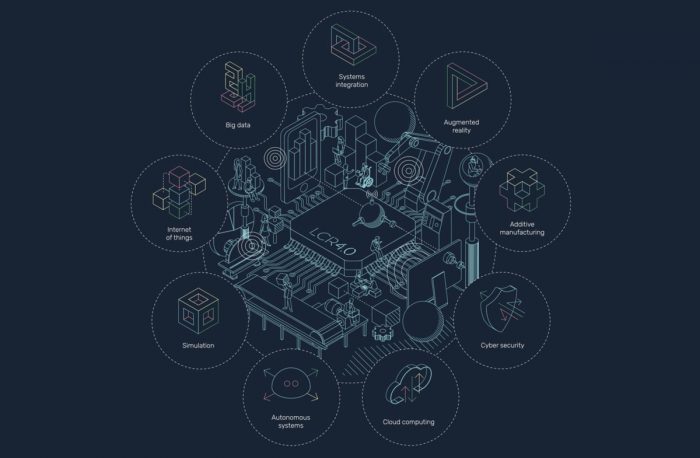LCR 4.0 solutions theatre

For Digital Manufacturing Week, the LCR 4.0 project teamed up with Invest Liverpool to bring audiences an exciting Solutions Theatre that discussed all topics relating to new and digital technologies, the challenges for manufacturing and how we are overcoming these.
We had a range of speakers from academics, to experts from the LCR 4.0 team, students and a number of local manufacturing SMEs, all offering their unique and valuable insights…
Martin Clocherty, Co-Founder and Managing Director for New Intelligence
New Intelligence have developed a new approach to factory planning, simulation and optimisation.
The company has drawn on their years of experience across both the semiconductor and general manufacturing realms to provide a solution, designed for manufactures by manufactures. This pairs traditional qualitative face-to-face diagnostics to develop a workable and tailored approach to change management and process optimisation with an ongoing low cost web service, which allows users to explore different constraints and contingencies virtually. This ensures the right solution is implemented into the business on day one and provides the flexibility to explore changes and alternatives as the business demands.
New Intelligence are continuously looking ahead to the future in order to ensure they stay competitive within their market whilst delivering support for businesses looking to digitally transform their businesses and embrace new technology, offering advice for manufacturers, by manufacturers, who really understand environmental challenges and concerns.
New Intelligence are providing SMEs with an affordable Software solution which truly embraces Industry 4.0 by using Learning algorithms and predicted simulation for identifying where corruption and issues lie within businesses and their data.
This software allows companies to run multiple simulations, allowing managers to gain an improved understanding of their company through a number of angles, allowing for better planning and more informed decision-making.
Tom Dawes, CEO for Valuechain
Valuechain digitalises manufacturing businesses to improve productivity, collaboration and competitiveness. Valuechain’s smart software solutions streamline business processes and capture data from people, plant and processes to generate real-time business and supply chain intelligence.
Valuechain have identified a number of challenges facing manufacturing SME’s including cash flow, demanding customers, constraints with limited resources and the need to work on your business consistently.
Tom Dawes advised attending delegates to look inward into their own business to identify what is core to their company before looking externally to how they are comparing to their competitors. Businesses can then begin to lay solid strategies down, which will help to focus on achieving their objectives as well as consider which digital tools can help to get them there.
Lesley Lambert (LJMU) – Changing the perception of women in Manufacturing and Engineering
As fewer than 10% of practising engineers in the UK are women, Women in LCR 4.0 Cluster Group deemed Digital Manufacturing Week as the ideal opportunity to promote women within industry, identify challenges and to discuss what can be done to overcome these.
Hannah Ankrah – Masters Student at LJMU
Hannah claims there is not enough diversity within manufacturing and based on previous negative experiences is doing a Masters in HR to try to develop the culture within manufacturing companies to ensure that diversity is embraced and encouraged.
Jennifer Wallace at MTC explains there are many women within MTC holding senior roles and these are fighting against the conception that manufacturing means getting dirty. MTC have a number of initiatives such as The Tilly Shilling Initiative to support women and do not have an issue with diversity within the workforce.
Shauna Craig – HR and apprentice lead at Vauxhall
Shauna wants to look at how recruiters can focus on appealing more to women for roles within manufacturing. One of the barriers Shauna feels needs to be abolished is that jobs within this industry means working on your own rather than a team.
Another barrier is that families often see Apprenticeships as a second choice over other qualifications whilst parents and teachers have a huge impact on the early awareness and interest of students towards careers. From primary school, gender stereotypes is implemented however; Vauxhall aims to encourage women to go towards manufacturing and engineering jobs by offering improved maternity pay, childcare vouchers and other incentives.
Caroline Arnold – LJMU
Whilst targeting young girls to try to raise interest from an early age, Caroline claims one of the greatest challenges can include a lack of women with maths A-level qualifications.
Teacher’s perception of maths is key, as we need to encourage the attitude towards math and improve parent’s awareness of this. With such qualifications, students can be in a great position coming out of University.
Caroline runs open days for teachers and outward projects for girls in order to try to challenge these issues, assuring young students, using your creativity and maths “You can build whatever you can imagine in your head.”
Michelle Dow – Managing Director for All About STEM
Michelle highlighted the lack of diversity within the theatre, looking around at all the women who had attended the talk but the lack of attending males from the expo. It is up to “us” to help change the perception of engineering, it must start at home, we cannot leave it to the teachers and let our girls and boys know what the opportunities are.
Michelle discussed how far the attitudes of diversity have come within manufacturing and engineering, claiming to have seen some workplaces, which did not even have a women’s toilet available for workers.
Hollie Hughes – Advanced degree apprentice for LJMU/Vauxhall
Hollie’s father works with Airbus and he realised Hollie’s potential from an early age and began to encourage her to consider a career within engineering.
Currently working on designs, Hollie has previously worked along the line and enjoys her time at Vauxhall. The support she received from her colleagues was like working with lots of “Dad’s and Uncle’s”.
Abbie – PHD student at LJMU
Abbie who attended the Solutions Theatre explained how through previous experiences, she agreed with all points which had been brought up in the Solutions Theatre. Abbie explained how young people don’t understand what is involved in manufacturing and engineering, therefore how can young people pick a career within manufacturing and engineering if they don’t know such jobs exists or what it entails.
Addictive Manufacturing Session
David Millar, Managing Director, Heap & Partners
Heap & Partners is a 152 years old manufacturing business that design, manufacture and distribute a comprehensive range of industrial valves, instrumentation and associated equipment to the oil & gas, chemical, petrochemical, pharmaceutical, power & utilities, nuclear, and life science industries, worldwide.
As a traditional manufacturer, additive manufacturing is not something they considered as their future; however, after speaking with the LCR 4.0 team based within the Virtual Engineering Centre, they looked into the possibility of using 3D printing to create more of their products.
“We are mixing the traditional way of working with the technology and creating solutions.”
Since this collaboration, the Heap & Partners own design engineers had a 3D printer brought for them, which helps towards their upskilling as they prepare to enter the Fourth Industrial revolution. The 3D printer is currently being used for genuine working parts for the company including real orders for their customers
David Millar also decided to look into Augmented Reality, which can demonstrate more features than just the solid model allowing for Machine learning and optical character recognition; leading to a whole new era for the company.
Since they received the LCR 4.0 support, Heap & Partners have brought in an apprentice and are looking to develop a new product, which they have already used the 3D printer for creating injection tools and then injection moulding. This allows the company to change their model quickly and in larger quantities.
“Get talking to people from LCR 4.0 who have the expertise and the technology to get you started”.
Gina Czarnecki, Founder of KOFFIN Company Ltd
Koffin was created to give people back their rights to a personal and affordable end, with new and greener technologies.
Halving the weight of a traditional coffin, the SME looked to make the product a lot cheaper and more eco-friendly for customers, by using more natural materials, which create no more CO2 omissions than natural wood.
After a lot of prototype development and material verifying, their uniquely ‘egg-shaped’ coffins are now going into genuine production where they also plan to use 3D printing techniques as part of the manufacturing process, proving that recycling can be a part of the additive manufacturing process.
Robotics, Cobotics and the Productivity Revolution
Madina Barker, Director CNC Robotics Ltd
Madina took to the stage to outline how CNC Robotics provide robotic and automated solutions to improve productivity outputs across their manufacturing clients explain how their business use robots in a huge manner of ways, some of which are very creative. Working together with Benjamin Salem, a Senior Lecture for the University of Liverpool within Industrial Design, they answered some of the audience questions…
People are scared of safety, robots taking over their jobs
Dr Benjamin Salem: Caution and wariness of this technology is normal. We have seen it before with the steam train that went faster than 25mph and planes where passengers were expected to pass out through the lack of oxygen. There is always going to be some scepticism.
Most robots are already on the factory line in warehouses, helping with the delivery of goods.
Robots are expensive
Madina Barker: One of the biggest misunderstandings regarding industrial automation is a high cost. CNC Robotics offer bespoke automated solutions a fraction of the cost of traditional machining tools. CNC Robotics was established when Jason Barker spotted a niche in the market; during his search for a low cost CNC machining solution, he recognised the potential of using robots as milling machines. Up to that date, robotics had traditionally only been used in the automation sectors, he realised that many other sectors could be transformed with the introduction of robotics. An industrial robot can undertake multiple functions whilst traditional machining tools are often only able to undertake a singular task.
CNC Robotics have introduced Robots as a Service to allow as many SMEs to embed automation into their businesses; providing both purchase and leasing options means that there is no single large capital outlay and it removes all barriers for manufacturers to increase their output.
Click here to see the collaborative project between CNC Robotics and Sensor City.
Machine Learning
Thomas Gorry, Managing Director for Quanovo
Quanovo look to help augment businesses using AI and Machine Learning technologies.
Whilst 45% of downtime comes from machines failing, the local SME sees an opportunity for improved efficiency and production across the manufacturing industry.
Quanovo recommended businesses to look into using a simple and cost-effective sensor kit, which can collect data from machinery and suggest where improvements can be made including productivity levels.
This real-time data could include temperature and pressure, displaying how machinery is performing on a daily basis and can help towards making improved and better-informed decisions, assess quality assurance, maintenance planning and forecasting, predictive quality control, helping to improve current productivity and efficiency.
Quanovo have also looked into the possibility of setting up automotive emails, which can respond to customers and enquiries quickly including for offering quotations, helping to improve customer engagement and satisfaction levels.
AI can even help quickly and conveniently create accurate reports and time sheets, however Quanovo squashed the rumour that AI replaces jobs, as customer service still needs a human for the jobs AI cannot complete just as AI only presents quantitative data, not qualitative which could help explain reasons behind certain data.
AI can also be used to provide a reaction to testing on digital twins within a factory for example, presenting information to help increase better and more informed decision-making.
Quanovo are looking to create accountability within AI, helping businesses to see where things may have gone wrong within their own internal processes. Here, humans can be biased even if unconsciously whereas this technology removes all bias. Unlike employees, AI cannot leave the business, taking valuable insights and expertise with them. Once invested in, they are an asset, which will always remain within the company and can be utilised across the company and the staff including new employees who can learn from this technology.
Explore more

Medical Manufacturer brings the operating theatre to life with new VR Tool
St Helens-based surgical simulation product design and manufacturer Inovus Medical (Inovus) is transforming medical training…

LCR 4.0 praised by new productivity task force
LCR 4.0 was recently invited to join a new government-backed task force to help tackle…

The Nine Pillars of Industry 4.0
You may have heard a lot about the fourth industrial revolution but do you know…